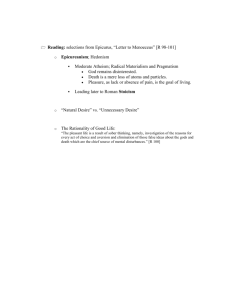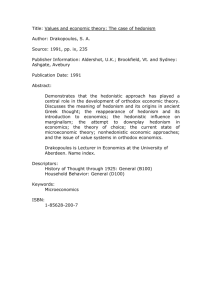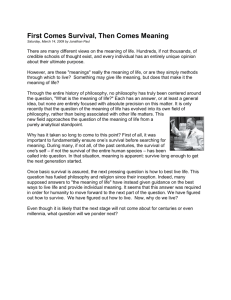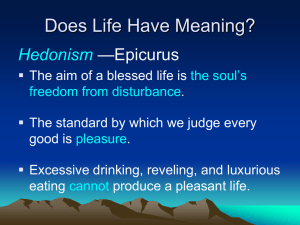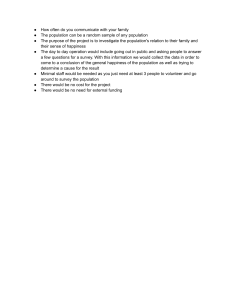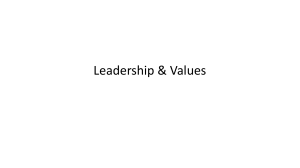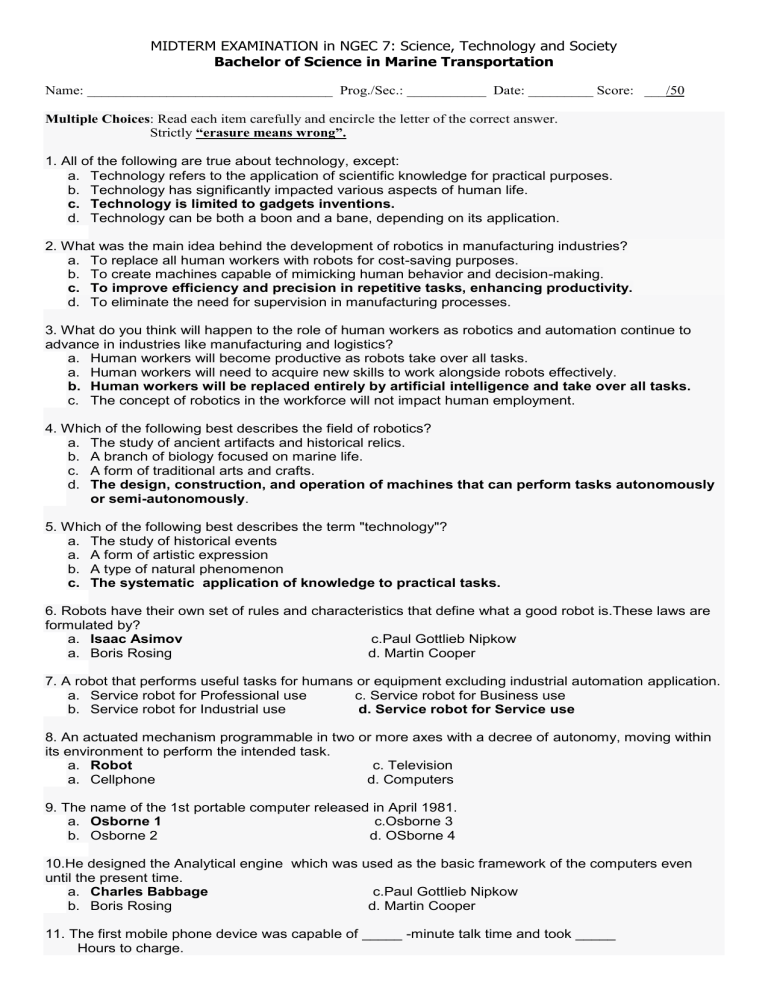
MIDTERM EXAMINATION in NGEC 7: Science, Technology and Society Bachelor of Science in Marine Transportation Name: __________________________________ Prog./Sec.: ___________ Date: _________ Score: ___/50 Multiple Choices: Read each item carefully and encircle the letter of the correct answer. Strictly “erasure means wrong”. 1. All of the following are true about technology, except: a. Technology refers to the application of scientific knowledge for practical purposes. b. Technology has significantly impacted various aspects of human life. c. Technology is limited to gadgets inventions. d. Technology can be both a boon and a bane, depending on its application. 2. What was the main idea behind the development of robotics in manufacturing industries? a. To replace all human workers with robots for cost-saving purposes. b. To create machines capable of mimicking human behavior and decision-making. c. To improve efficiency and precision in repetitive tasks, enhancing productivity. d. To eliminate the need for supervision in manufacturing processes. 3. What do you think will happen to the role of human workers as robotics and automation continue to advance in industries like manufacturing and logistics? a. Human workers will become productive as robots take over all tasks. a. Human workers will need to acquire new skills to work alongside robots effectively. b. Human workers will be replaced entirely by artificial intelligence and take over all tasks. c. The concept of robotics in the workforce will not impact human employment. 4. Which of the following best describes the field of robotics? a. The study of ancient artifacts and historical relics. b. A branch of biology focused on marine life. c. A form of traditional arts and crafts. d. The design, construction, and operation of machines that can perform tasks autonomously or semi-autonomously. 5. Which of the following best describes the term "technology"? a. The study of historical events a. A form of artistic expression b. A type of natural phenomenon c. The systematic application of knowledge to practical tasks. 6. Robots have their own set of rules and characteristics that define what a good robot is.These laws are formulated by? a. Isaac Asimov c.Paul Gottlieb Nipkow a. Boris Rosing d. Martin Cooper 7. A robot that performs useful tasks for humans or equipment excluding industrial automation application. a. Service robot for Professional use c. Service robot for Business use b. Service robot for Industrial use d. Service robot for Service use 8. An actuated mechanism programmable in two or more axes with a decree of autonomy, moving within its environment to perform the intended task. a. Robot c. Television a. Cellphone d. Computers 9. The name of the 1st portable computer released in April 1981. a. Osborne 1 c.Osborne 3 b. Osborne 2 d. OSborne 4 10.He designed the Analytical engine which was used as the basic framework of the computers even until the present time. a. Charles Babbage c.Paul Gottlieb Nipkow b. Boris Rosing d. Martin Cooper 11. The first mobile phone device was capable of _____ -minute talk time and took _____ Hours to charge. a. 10;20 b. 10;30 c. 30;20 d.30;10 12. When was the first mobile phone call conducted? a. April 2, 1973 c. April 4,1973 b. April 3, 1973 d.April 5, 1973 13. He was a German student who became successful in his attempt to send images through wires with the aid of a rotating disk. a. Alan Archibald Campbell-Swinton c.Paul Gottlieb Nipkow b. Boris Rosing d. Martin Cooper 14. How does hedonism differ from humanism in their views on the "good life"? a. Hedonism focuses on maximizing pleasure and minimizing pain, while humanism emphasizes personal growth and self-fulfillment. b. Both hedonism and humanism prioritize personal happiness, but hedonism places a stronger emphasis on material wealth. c. Hedonism and humanism are essentially the same in their approach to the "good life." d. Hedonism promotes complete isolation from society, whereas humanism advocates strong social connections. 15. From a materialistic standpoint, what is often emphasized as a key component of the "good life"? a. Pursuit of knowledge and intellectual growth b. Spiritual fulfillment and inner peace c. Accumulation of wealth and material possessions d. Development of strong social relationships 16. What do you think is a central tenet of Stoicism, an ancient philosophical school of thought? a. Philosophical school that advocates seeking pleasure and avoiding pain. b. A belief system that encourages living in accordance with nature. c. A doctrine that promotes detachment from society and human emotions. d. Gaining power and control over others. 17.What were the differences in Aristotle's and Plato's views on the "good life"? a. Both philosophers believed in the pursuit of personal happiness. b. Aristotle emphasized individual flourishing, while Plato focused on communal well-being. c. They both rejected the idea of the "good life" as a philosophical concept. d. Plato advocated for the importance of self-realization, while Aristotle valued collective harmony. 18.Which of the following best defines theism? a. The belief in the absence of any deities or gods. b. The belief in a single, all-powerful deity or God. c. The rejection of religious faith and spirituality. d. The belief in multiple deities or gods. 19. What idea does materialism typically emphasize? a. The importance of spiritual and metaphysical experiences. b. The significance of accumulating material wealth and possessions. c. The pursuit of knowledge and self-actualization. d. The rejection of consumerism and material possessions. 20.Which statements support the concept of the "good life" as a holistic and well-rounded pursuit? a. Accumulating vast material wealth is the sole indicator of a good life. b. The good life is exclusively about maximizing pleasure and hedonistic experiences. c. A good life encompasses physical health, meaningful relationships, personal growth, and happiness. d. The pursuit of a good life should prioritize isolation from society. 21. This school exposed the idea himself and be apathetic. a. Hedonism b. Stoicism that in order to generate happiness, one must learn to distance c. Theism d. Materialism 22. The ultimate basis of happiness for a Theist person is? a. Material possessions c. Pleasure b. God d. Being alone 23. What is the famous mantra of Hedonism? a. “ Eat, drink, and be merry for tomorrow we die”. b. “ Man is literally the captain of his own ship”. c. “I create my own path and walk it with joy.” d. “My positive thoughts guide me to new heights.” 24. This school espoused the freedom of man to carve his own destiny and legislate his own laws, free from the shackles of a God that monitors and controls. a. Humanism c. Stoicism b. Theism d.Hedonism 25. These are the philosophers who believe that the physical universe is composed of indivisible units of particles called atoms. a. Scientist c. Greeks b. Atomist d. Psychologist 26. From a theistic perspective, what is the primary belief regarding the "good life"? a. The "good life" is achieved through scientific progress and technological advancement. b. The "good life" is synonymous with material wealth and possessions. c. The "good life" is found in adherence to religious principles and spiritual fulfillment. d. The "good life" is unrelated to one's beliefs and values. 27. These are the schools led by philosopher Epicurus. a. Humanism and Materialism c. Hedonism and Stoicism b. Stoicism and Humanism d. Theism and Hedonism 28. According to hedonism, what is the central principle that defines the "good life"? a. Pursuit of virtue and moral excellence b. Accumulation of wealth and possessions c. Maximization of pleasure because life is limited d. Achievement of spiritual enlightenment 29. He declared the greatest happiness philosophy by saying that an action is right as long as it maximizes the attainment of happiness for the greatest number of people. a. John Stuart Mill c. Plato b. Socrates d. John Adams 30. This Philosopher thought that things in this world are not real and are only copies of the real in the world of forms. a. Plato c. Socrates b. Aristotle d. Mill 31.Why do we use technology as a way of revealing things in our society? a. To hide and conceal information b. To complicate and obscure the truth c. To simplify and clarify complex processes d. To maintain secrecy and ambiguity 32. How does Heidegger characterize the role of modern technology in relation to revealing? a. Modern technology conceals the true nature of reality. b. Modern technology reveals the essence of human existence. c. Modern technology facilitates a deeper understanding of nature. d. 2qazModern technology has no impact on revealing. 33. How could you use technology as a way of revealing educational content and improving learning experiences? a. By developing interactive e-learning platforms b. By planting more trees on school campuses c. By organizing poetry competitions d. By volunteering at local libraries 34. What would happen if technology was solely used for profit and commercial purposes, neglecting its role in revealing the world? a. Our understanding of the world would be enriched. b. Technological advancements would accelerate. c. Knowledge would be constrained, and important discoveries might be overlooked. d. Society would become more focused on exploration and discovery. 35. What other way would you expect the Holocene extinction to impact biodiversity? a. By significantly increasing the population of endangered species. b. By leading to the proliferation of diverse ecosystems. c. By causing a decline in global biodiversity. d. By having no noticeable impact on biodiversity. 36. It is attributed mainly to the changes brought about by technology. Mostly those who belong to the older generation think that these technologies are too complicated to operate. a. Generation gap c. Empirical gap b. Age gap d. Breakaway gap 37. According to Martin Heidegger, technology is a form of ________- a way of revealing that unconceals __________ or the truth. a. Poiesis; Aletheia c. Poiesis; Alethea b. Poeisis; Aletheia d. Poeisis; Alethea 38. Higher country income brought by high productivity, often an indicator of technology. a. Gross Domestic Product c. Export b. Import d. Gross National Product 39. For a long time, humans are content with their relationship with nature. Earliest case of man-made extinction occurred over ____________ ago, possibly brought by hunting & territorial disputes. a. 10,000 c.12,000 b. 11,000 d. 13,000 40. The ongoing extinction of several species - both flora and fauna as a result of Human activity. a. Functional Extinction c. Holocene Extinction b. Homo Extinction d. Pseudo Extinction 41. What is the scientific method? a. A fixed set of rules for conducting experiments b. A step-by-step procedure used to solve scientific problems c. A collection of scientific facts and theories d. A method for proving preconceived ideas 42. Which of the following is an example of a falsifiable scientific hypothesis? a. "All swans are white." c "Gravity exists." b. "The Earth is round." d. "Water boils at 100 degrees Celsius." 43. According to the falsification theory, what is the primary goal of scientific theories? a. To confirm established beliefs b. To provide empirical evidence for existing ideas c. To be falsifiable and subject to empirical testing d. To gain widespread popularity 44. Who is the proponent of Falsification Theory? a. Rene Descartes b. Rene Decartes c.Karl Popper d.Carl Popper 45. This theory gives a premium to empiricism and only takes into account those results which are measurable and experiments which are repeated. . a. Falsification Theory b. Quantum Theory c. Empirical Theory d. Verification Theory 46. In the scientific method, what is a hypothesis? a. A proven scientific fact b. A conclusive theory c. A random idea with no basis in reality d. An educated guess or a testable explanation for an observation 47. Which of the following is the first step in the scientific method? a. Formulating a hypothesis c. Making observations b. Collecting data d. Drawing conclusions 48. What is the fourth step in the scientific method? a. Data analysis c. Hypothesis b. Experimentation d. Research 49. ________, literally means “good spirited”, is a term coined by a renowned Greek Philosopher,_______? a. Eudaimonia: Aristotle c. Eudaimonia: Socrates b. Eudeimonia: Plato d. Eudeimonia: Socrates 50. As discussed in the book Nicomachean Ethics, Aristotle’s human flourishing arises as a result of different components.These components are? a. Phronesis, wisdom, friendship and power b. Power, friendship, wealth and phronesis c. Power, friendship, wealth and synthesis d. Phronesis, wisdom, kindness and power “The best way to predict your future is to create it.” by Abraham Lincoln
